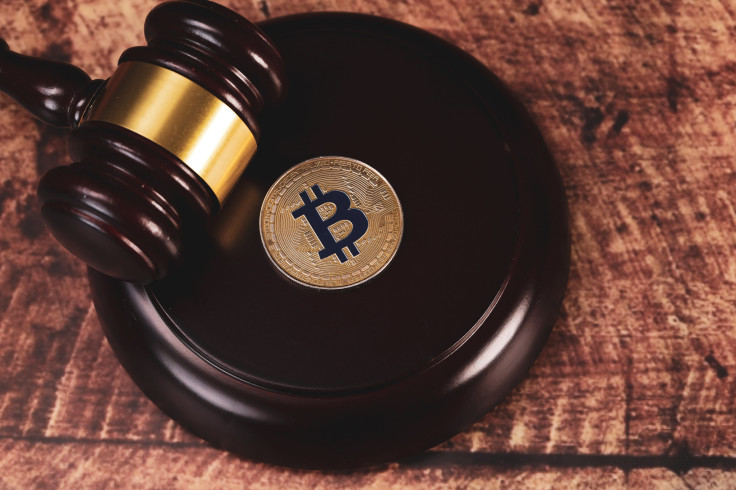Celsius Tether Legal Showdown: Stablecoin Giant Nearing End Of 'Borrowed Time'?

KEY POINTS
- Celsius aims to recover some $2.4 billion in Bitcoins it transferred to Tether as collateral for a loan during its bankruptcy proceedings
- Tether said the lawsuit was "baseless" and its CEO said the case should be an example that money-grab cases won't work
- Some X users believe Tether's fall has begun, given the recent questions about its business practices
- Others said Celsius was a "Ponzi" scheme and the case is a matter of "sharks eating themselves"
In the cryptocurrency realm where lawsuits are a norm, defunct cryptocurrency exchange Celsius has taken stablecoin titan Tether to court, alleging misappropriation by the company behind the world's largest stablecoin, $USDT.
'Fraudulent' Bitcoin transfers?
Celsius alleged that Tether loaned it a certain amount of $USDT during its bankruptcy proceedings in 2022. As collateral, Celsius said it sent Tether over 39,500 Bitcoins, and the crypto exchange now states that the move was "preferential and fraudulent" since the $BTC transferred "undoubtedly improved Tether's position, occurring at a time when Debtors were tumbling towards bankruptcy and the price of Bitcoin (and the value of Tether's pre-existing collateral) was collapsing violently."
Celsius further noted that its lawsuit aims to recover damages "caused by Tether's below-market application" of the transferred Bitcoin, which allegedly violated "the terms of the governing agreement." Based on current prices, Celsius wants to recover some $2.4 billion in Bitcoin.
Tether slams 'baseless' lawsuit
Tether responded to the legal claim, calling it "baseless," alleging that Celsius was supposed to "post additional collateral" to avoid liquidation, as required by the agreement. However, Celsius allegedly didn't provide additional Bitcoins and instead "directed Tether to liquidate the $BTC collateral."
The company said it will "never fall prey to shameless litigation money grabs," adding that it will defend itself from the crypto exchange's accusations.
CEO says Tether won't fall to 'bullying'
Tether CEO Paolo Ardoino has since released a statement on the matter, saying "bullying never scares us," and promising that "this lawsuit will be fought till the end." He went on to say that Tether will use the case to set an example "on behalf of the entire industry" that money-grab lawsuits will not work against it.
In 2022, Tether made available USDt to some of its customers – including Celsius. Tether's arrangements with customers are very simple: Tether provides USDt to selected customers who provide an overcollateralization in Bitcoin.
— Paolo Ardoino 🤖🍐 (@paoloardoino) August 10, 2024
If the price of bitcoin (the collateral) falls… https://t.co/UuEs1ig8zr
He defended the company's lending strategy, saying its process was "overcollateralization with sound assets" instead of agreements that only required a "pinky swear" since it was part of its commitment to risk management.
A ticking time bomb
Many users on X believe Celsius' lawsuit will unravel other aspects of Tether's business that some have raised questions about. One user said the stablecoin behemoth "has been living on borrowed time" but once the U.S. approves a stablecoin law, the company will crumble.
Tether should invite Celsius over for lunch and hammer out a deal. It’s in their best interest. Who knows what the US government might sniff out during those discovery hearings😂😂
— LoveTruthJoy (@LoveTruthJoy) August 11, 2024
Tether has been living on borrowed time. As soon as the US gets a stable coin law on the books, they’re done. Just grifting until then.
— Adrian 🚀 (@YoAdrian305) August 10, 2024
The fall of tether inbound
— Ben (@swoop_x) August 10, 2024
Another prediction playing out 👏
Tether is trash. It's not backed by anything. There's no daily or weekly audit. No way to know if it's really backed 1:1 by any asset. Tether needs investigated. We don't need more corrupt financial entities playing games with our money. Tether is so unregulated it's printing $$$
— Nerdy the Clown (@Nerdybiznitch) August 10, 2024
A 'corrupt' business?
News of Celsius' lawsuit came less than two months after nonprofit Consumers' Research ran an ad on a Times Square billboard that accused Tether of "corruption." The ad accused the $USDT maker of "price manipulation," "fraud," and called it "the next FTX."
In mid-May, Ripple CEO Brad Garlinghouse said he believes "the U.S. government is going after Tether." A week earlier, Ripple, announced plans to launch a dollar-pegged stablecoin that could likely rival $USDT.
Earlier this year, reports emerged that the United States and United Kingdom were investigating some $20 billion worth of $USDT that flowed through sanctioned Garantex, a Russia-based crypto exchange.
Birds of the same feather?
Meanwhile, many other X users said the legal showdown between Celsius and Tether is similar to "sharks eating themselves." One user called Celsius a "Ponzi" scheme, and argued that Tether funded the said scheme so the $USDT creator is technically "guilty by association."
Celsius has yet to respond to Tether's clap-back. The fallen exchange emerged from bankruptcy in January and said it has started distributing over $3 billion to creditors.
© Copyright IBTimes 2024. All rights reserved.



















